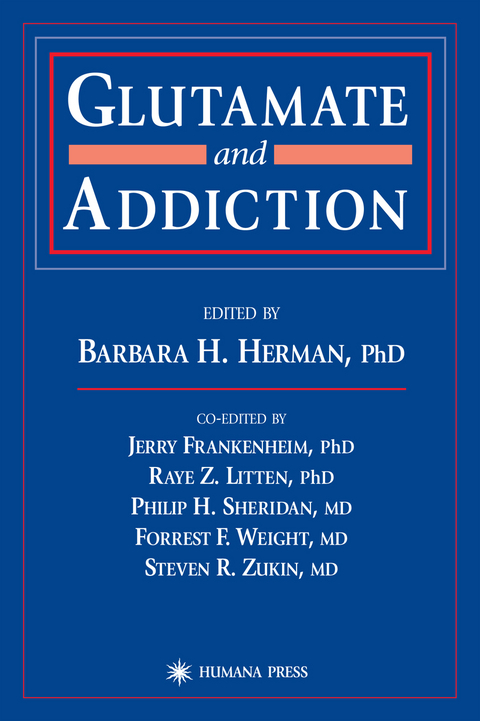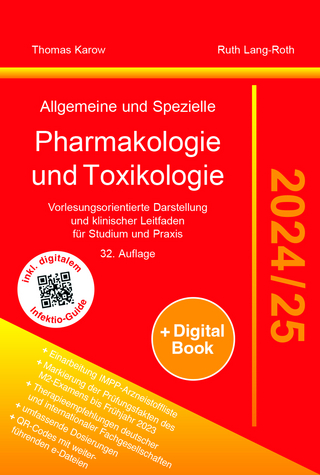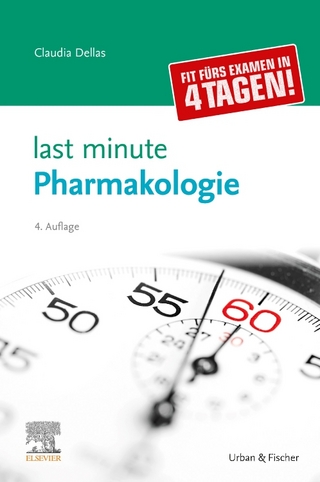
Glutamate and Addiction
Humana Press Inc. (Verlag)
978-0-89603-879-0 (ISBN)
I. Introduction: Physiology and Pharmacology of Glutamate.- 1 Molecular Pharmacology and Physiology of Glutamate Receptors.- 2 Pharmacology of Glutamate Receptors.- 3 Glutamate and Neurotoxicity.- 4 Maturational Regulation of Glutamate Receptors and Their Role in Neuroplasticity.- 5 Role of the NMDA Receptor in Neuronal Apoptosis and HIV-Associated Dementia.- II. Glutamate: Stimulant Drugs of Abuse (Cocaine, Amphetamine, Methamphetamine).- 6 Role of Glutamate and Nitric Oxide in the Acquisition and Expression of Cocaine-Induced Conditioned Increases in Locomotor Activity.- 7 Interactions of Dopamine, Glutamate, and GABA Systems in Mediating Amphetamine- and Cocaine-Induced Stereotypy and Behavioral Sensitization.- 8 Addiction and Glutamate-Dependent Plasticity.- 9 Glutamate and Dopamine Interactions in the Motive Circuit: Implications for Craving.- 10 Glutamate Cascade from Metabotropic Glutamate Receptors to Gene Expression in Striatal Neurons: Implications for Psychostimulant Dependence and Medication.- 11 Glutamate Neurotransmission in the Course of Cocaine Addiction.- 12 Glutamate and the Self-Administration of Psychomotor-Stimulant Drugs.- 13 Roles of Glutamate, Nitric Oxide, Oxidative Stress, and Apoptosis in the Neurotoxicity of Methamphetamine.- 14 Methamphetamine Toxicity: Roles for Glutamate, Oxidative Processes, and Metabolic Stress.- 15 Nitric Oxide-Dependent Processes in the Action of Psychostimulants.- 16 Effects of Novel NMDA/Glycine-Site Antagonists on the Blockade of Cocaine-Induced Behavioral Toxicity in Mice.- 17 Clinical Studies Using NMDA Receptor Antagonists in Cocaine and Opioid Dependence.- 18 The Role of mGluR5 in the Effects of Cocaine: Implications for Medication Development.- III. Glutamate and Opiate Drugs (Heroin) of Abuse.- 19 Role of theGlutamatergic System in Opioid Tolerance and Dependence: Effects of NMDA Receptor Antagonists.- 20 The Role of NMDA Receptors in Opiate Tolerance, Sensitization, and Physical Dependence: A Review of the Research, A Cellular Model, and Implications for the Treatment of Pain and Addiction.- 21 Modification of Conditioned Reward by N-Methyl-D-aspartate Receptor Antagonists.- 22 Morphine Withdrawal as a State of Glutamate Hyperactivity: The Effects of Glutamate Receptor Subtype Ligands on Morphine Withdrawal Symptoms.- IV. Glutamate and Alcohol Abuse and Alcoholism.- 23 Alcohol Actions on Glutamate Receptors.- 24 Glutamate and Alcohol-Induced Neurotoxicity.- 25 Role of Glutamate in Alcohol Withdrawal Kindling.- 26 Alcohol and Glutamate Neurotransmission in Humans: Implications for Reward, Dependence, and Treatment.- 27 Mechanism of Action of Acamprosate Focusing on the Glutamatergic System.- 28 The NMDA/Nitric Oxide Synthase Cascade in Opioid Analgesia and Tolerance.- 29 Overview of Clinical Studies for Acamprosate.
"Illuminating, authoritative, and forward looking, Glutamate and Addiction clarifies for the first time the relationship between glutamatergic systems and addiction investigations of many of today's emerging therapeutics for addictive disorders." -Biomedicine and Pharmacotherapy
| Erscheint lt. Verlag | 22.8.2002 |
|---|---|
| Reihe/Serie | Contemporary Clinical Neuroscience |
| Zusatzinfo | XVIII, 440 p. |
| Verlagsort | Totowa, NJ |
| Sprache | englisch |
| Maße | 178 x 253 mm |
| Themenwelt | Medizin / Pharmazie ► Medizinische Fachgebiete ► Pharmakologie / Pharmakotherapie |
| Medizin / Pharmazie ► Pharmazie | |
| Studium ► 2. Studienabschnitt (Klinik) ► Pharmakologie / Toxikologie | |
| Naturwissenschaften ► Biologie ► Humanbiologie | |
| ISBN-10 | 0-89603-879-3 / 0896038793 |
| ISBN-13 | 978-0-89603-879-0 / 9780896038790 |
| Zustand | Neuware |
| Haben Sie eine Frage zum Produkt? |
aus dem Bereich


